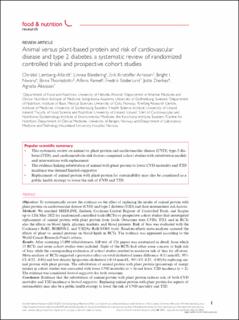| dc.contributor.author | Lamberg-Allardt, Christel | |
| dc.contributor.author | Bärebring, Linnea | |
| dc.contributor.author | Arnesen, Erik Kristoffer | |
| dc.contributor.author | Nwaru, Bright I. | |
| dc.contributor.author | Thorisdottir, Birna | |
| dc.contributor.author | Ramel, Alfons | |
| dc.contributor.author | Söderlund, Fredrik | |
| dc.contributor.author | Dierkes, Jutta | |
| dc.contributor.author | Åkesson, Agneta | |
| dc.date.accessioned | 2024-01-02T12:50:50Z | |
| dc.date.available | 2024-01-02T12:50:50Z | |
| dc.date.created | 2023-06-21T14:57:13Z | |
| dc.date.issued | 2023 | |
| dc.identifier.issn | 1654-6628 | |
| dc.identifier.uri | https://hdl.handle.net/11250/3109349 | |
| dc.description.abstract | Objectives: To systematically review the evidence on the effect of replacing the intake of animal protein with plant protein on cardiovascular disease (CVD) and type 2 diabetes (T2D) and their intermediate risk factors.
Methods: We searched MEDLINE, Embase, Cochrane Central Register of Controlled Trials, and Scopus up to 12th May 2022 for randomized controlled trials (RCTs) or prospective cohort studies that investigated replacement of animal protein with plant protein from foods. Outcomes were CVDs, T2D, and in RCTs also the effects on blood lipids, glycemic markers, and blood pressure. Risk of bias was evaluated with the Cochrane’s RoB2, ROBINS-I, and USDA’s RoB-NObS tools. Random-effects meta-analyses assessed the effects of plant vs. animal proteins on blood lipids in RCTs. The evidence was appraised according to the World Cancer Research Fund’s criteria.
Results: After screening 15,090 titles/abstracts, full text of 124 papers was scrutinized in detail, from which 13 RCTs and seven cohort studies were included. Eight of the RCTs had either some concern or high risk of bias, while the corresponding evaluation of cohort studies resulted in moderate risk of bias for all seven. Meta-analyses of RCTs suggested a protective effect on total cholesterol (mean difference -0.11 mmol/L; 95% CI -0.22, -0.01) and low-density lipoprotein cholesterol (-0.14 mmol/L; 95% CI -0.25, -0.02) by replacing animal protein with plant protein. The substitution of animal protein with plant protein (percentage of energy intake) in cohort studies was associated with lower CVD mortality (n = 4) and lower T2D incidence (n = 2). The evidence was considered limited-suggestive for both outcomes.
Conclusion: Evidence that the substitution of animal protein with plant protein reduces risk of both CVD mortality and T2D incidence is limited-suggestive. Replacing animal protein with plant protein for aspects of sustainability may also be a public health strategy to lower the risk of CVD mortality and T2D. | en_US |
| dc.language.iso | eng | en_US |
| dc.publisher | Swedish Nutrition Foundation | en_US |
| dc.rights | Navngivelse 4.0 Internasjonal | * |
| dc.rights.uri | http://creativecommons.org/licenses/by/4.0/deed.no | * |
| dc.title | Animal versus plant-based protein and risk of cardiovascular disease and type 2 diabetes: a systematic review of randomized controlled trials and prospective cohor t studies | en_US |
| dc.type | Journal article | en_US |
| dc.type | Peer reviewed | en_US |
| dc.description.version | publishedVersion | en_US |
| dc.rights.holder | Copyright 2023 The Author(s) | en_US |
| dc.source.articlenumber | 9003 | en_US |
| cristin.ispublished | true | |
| cristin.fulltext | original | |
| cristin.qualitycode | 1 | |
| dc.identifier.doi | 10.29219/fnr.v67.9003 | |
| dc.identifier.cristin | 2156704 | |
| dc.source.journal | Food & Nutrition Research (FNR) | en_US |
| dc.identifier.citation | Food & Nutrition Research (FNR). 2023, 67, 9003 . | en_US |
| dc.source.volume | 67 | en_US |

